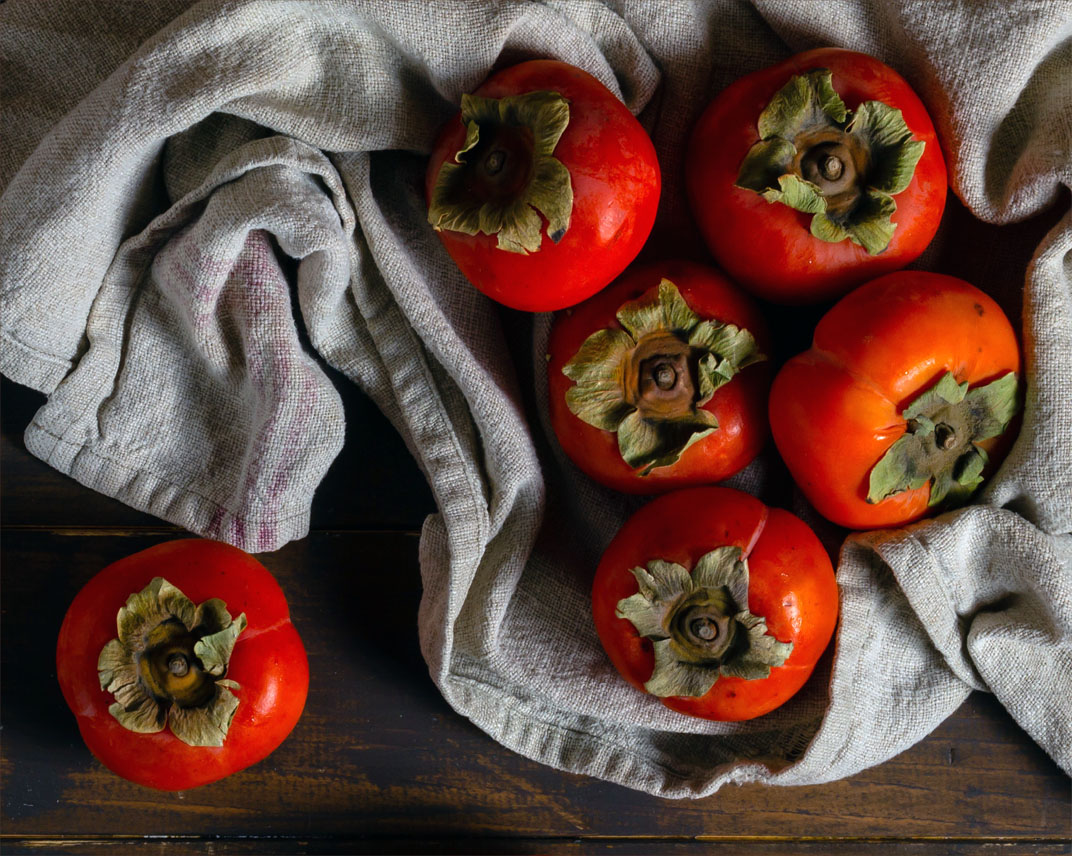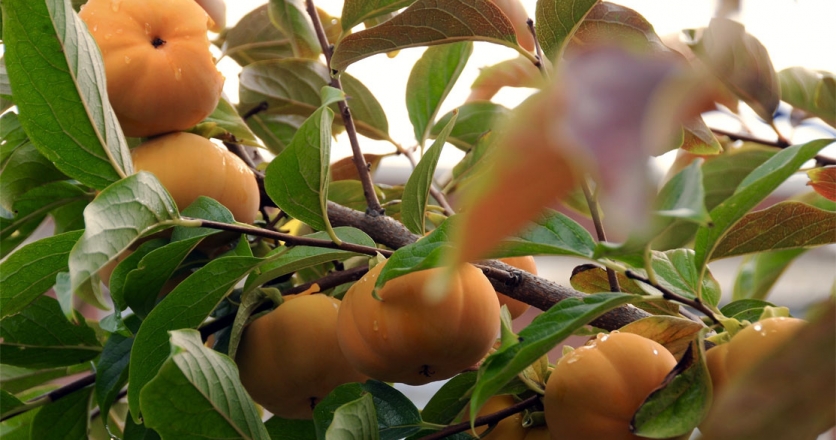Persimmons, Exotically Local
My mother once told me that when she was little, broccoli was completely foreign to her and, in fact, she ate it for the first time as an adult. I remember finding that hard to believe. The humble, see-it-everywhere brassica was not available in Mexico in the 1940s? These days, broccoli is seldom seen as a rare treat. Thanks to globalization, many fruits and vegetables that once seemed exotic can be found at any produce shop, from the ubiquitous pineapple to the intriguing dragon fruit. Most of these items are grown elsewhere. However, thanks to innovative farmers, one that might still be considered mysterious grows right here in Vancouver: the persimmon.
This glossy jewel-toned fruit has been cultivated for thousands of years in China and Japan. Its botanical name—Diospyros—translates to “food of the gods,” and there are reasons for such a mighty name. High in fibre and vitamin C, persimmons can be eaten fresh, roasted, dried, or cooked. The two popular varieties—the elongated, heart-shaped Hachiya and the orange, tomato-shaped Fuyu—are very different in terms of their culinary use and each presents a different experience when eaten raw. The Hachiya has a high tannin content, which makes the unripe fruit astringent and unpalatable if eaten before it has completely softened. The sweeter, non-astringent Fuyu can be eaten raw even when it’s hard.
Persimmons are typically found in subtropical zones, and while Vancouver is far from the optimal climate, the inventive farmers at Sole Food Street Farms have managed to grow Fuyu persimmons in this region.
Sole Food is one of North America’s largest urban-agriculture social enterprises. Beyond growing organic premium-quality produce on previously neglected land and parking lots throughout Vancouver’s Downtown East Side, it is known for its unique mission to provide empowering jobs and agricultural training to neighbourhood residents. Sole Food is also known for its model of production that pushes boundaries, extending growing seasons and successfully raising crops that normally don’t thrive in Canada, such as persimmons.
When in 2012 Michael Ableman, co-founder and director of Sole Food, planted 25 Fuyu trees in the Sole Food orchard, people thought he was crazy. Not only do persimmons prefer warmer climates but the orchard is located in an abandoned lot at the corner of Main Street and Terminal Avenue, one of the busiest intersections in Vancouver. “This urban tumult,” he writes in his book Street Farm, “the constant building up and tearing down, witnessing architectural and industrial visions come to life all around, inspired me to want to create something that had the qualities of a forest, provided shade and refuge, and made fruit. I imagined a visually striking and movable perennial orchard, made up of diverse species of fruit trees.” Here, the orchard is a welcome one-acre oasis amidst the noise and traffic, and the ever-changing city landscape.
And so, Sole Food’s urban orchard became one of the largest in North America. The movable farming system, with trees planted in a series of custom-made raised boxes rather than in the ground, allowed Sole Food to isolate the growing medium from native soil—which in this case was contaminated by the gas station that formerly occupied the site. Using raised boxes was already highly experimental. Fruit trees are not normally grown in this manner, as they need access to open ground to accommodate their deep rooting requirements. “This was kind of jump off the cliff,” recalls Michael during our phone interview. “We really didn’t see the point with such a small planting, in trying to grow things that were commonly grown in larger commercial orchards in the Okanagan. So we made the decision to select cultivars (varieties) that were unusual or not currently being grown. Persimmons are one of them.” In addition to persimmons, the Sole Food orchard grows figs next to more typical British Columbia crops like apples, pears, cherries, and plums.
While Vancouver’s latitude might present the biggest challenge in growing persimmons, there are some unexpected advantages to growing them in raised boxes placed on warm pavement, as the black plastic containers act as solar collectors. Persimmons require a fair amount of heat to fully colour up and mature, and the extra heat from the containers can dramatically enhance growth and quality.
Michael often refers to growing persimmons as a miracle, acknowledging the challenges involved, but also the tree’s inherent beauty. “The tree is beautiful at every stage,” he writes in the book, “from first leaves, flowers, and new-set fruit to the falling of autumn’s burnt-orange and red foliage, which reveals fat Day-Glo globes hanging like ornaments on leafless trees.”
The journey has not been an easy one, but it has in the end rendered a triumph. In the fall of 2015 Sole Food harvested over 400 pounds of persimmons. “The first year we had a big crop,” Michael recounts. “We gave them to the restaurants and when a few other growers saw them in the kitchen of local restaurants, they thought we had purchased them from Chinatown,” he adds with a laugh.
Today, close to 500 trees—persimmons, figs, apples, cherries, plums, pears, and quinces—are part of Sole Food’s orchard and thrive in the heart of the city. Sole Food is the result of hope and resilience but also hard work and a deep-rooted commitment to growing high-quality food in the most unlikely places. Its inspiring journey has proven that urban farming is much more than a bounty harvest—it’s about building community, teaching the new generations, and providing meaningful jobs and inclusion to people facing challenges.
Sole Food Street Farms
#210 – 128 West Hastings Street Vancouver, BC V6B 1G8
solefoodfarms.com | (778)-228-9566
Farm Locations
Headquarters Farm – 299 West 1st Ave. (Corner of W 1st & Crowe St)
Tunnel Houses – 1st & Clark (beneath 1st Ave. bridge)
Urban Orchard – Corner of Main & Terminal
Original Farm – Corner of Hawks & Hastings







